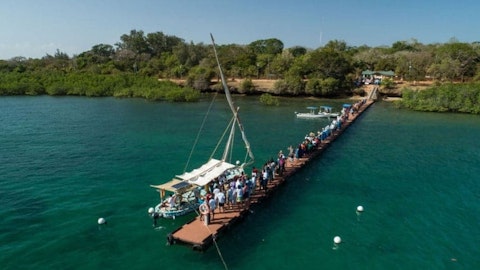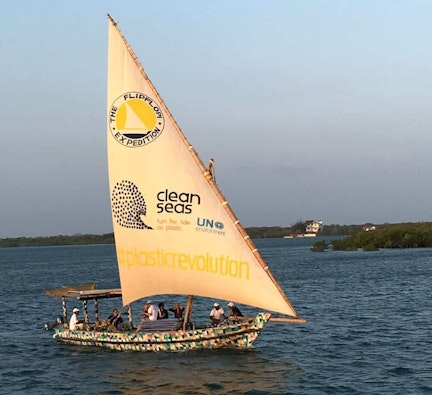Perspectives

Ocean plastic is a hot topic. We’re by now all too familiar with images of whales eating plastic bags and baby birds with bellies full of plastic waste, even in the most remote parts of our planet. In fact, startling research by the Ellen MacArthur Foundation suggests that, by 2050, there will be more plastic (by weight) in the oceans than fish.
Thanks in part to that ‘Blue Planet’ moment, the Western world has started to wake up to the ‘plastic planet’ catastrophe. However, the biggest emitters of ocean plastics are developing countries, with 90% of all ocean plastic waste coming from just ten rivers –eight in Asia and two in Africa. It’s these rapidly emerging consumer populations that are key to shaping the future of the ocean plastic issue. And yet for the vast majority – who live inland and don’t know the coast – there’s little to connect them directly to the problem.
The Flipflopi is about changing mindsets and inspiring the next generation to find their own ways to reuse plastic
How, then, can we ensure the message both reaches and hits home with this huge number of ‘new consumers’? How can we get them to think differently about production and consumption of single-use plastics before the throwaway addiction that exists in the West takes hold?
This is the question The Flipflopi founders dreamed to answer when embarking on an ambitious project to kickstart a ‘plastic revolution’ from Africa. They wanted to find a positive way to connect with local people and create a sustainable demand for waste plastic. The Flipflopi – named because she’s covered with over 30,000 multicoloured flip-flops – is the world’s first sailing boat made entirely from discarded plastic that was picked up from towns and beaches in Kenya. She’s a colourful and positive emblem that people can relate to and proves that it is possible to give the plastic washed up from our oceans a valuable second life.
It took 50 people just three hours to collect the ten tonnes of plastic used to create The Flipflopi, a 10-metre traditional sailing ‘dhow’ built by Swahili craftsmen on the remote island of Lamu on the coast of Kenya. She was built using only local resources, recycling technology and traditional dhow-building techniques. Our aim was to show that if this could be done somewhere like Lamu it could be done anywhere, making such projects accessible to local communities all around the world.
In January last year, our 15-man crew, made up of Kenyan sailors and a team of volunteers, sailed The Flipflopi on her inaugural expedition – from Lamu, 500km down the East African coast to Zanzibar in neighbouring Tanzania. Their mission was to engage communities in the fight against single-use plastic and draw the world’s media attention to a plastic revolution being led out of Africa.

We sought to engage people through first making them smile. We then showed them the value of reusing waste plastic, while also sending the serious message that single-use plastic really doesn’t make sense. We always hoped that our flip-flop-covered boat made from ‘takataka’ (Swahili for ‘rubbish’) would lead to positive engagement with the issue, but the impact of the expedition far exceeded our expectations.
By the end of the two-week expedition (stopping at 12 coastal communities along the way), we’d engaged 10,000 community members including 5,000 schoolchildren and mobilised 100 local NGO partners along the coast. Forty businesses, including a prominent hotel group, banned single-use plastic. Mombasa’s county government finally committed to close their biggest dumpsite and install an environmentally friendly one in its place. And, in just two weeks, our positive media campaign reached an estimated 890 million people worldwide.
While the numbers are compelling, The Flipflopi Project has never really been about the boat – it’s about changing mindsets and inspiring the next generation to find their own ways to reuse plastic. It’s the individual moments on our travels that highlight the true mission of the plastic revolution – when a child asks you ‘why’ when they board a boat made from old toothbrushes and flip-flops, you know that something magical is starting to happen.

Sailing the message around the world
The reality is that we’re standing on the edge of a global catastrophe and need to rapidly scale up our efforts and engagement. In order to take the plastic revolution around the world, we’re now building a dramatically bigger ocean-faring boat to sail from Kenya to Cape Town – a record-breaking, three-month 5,00km expedition. Our aim is to reach corporates, individuals, and policymakers who hold the keys to turning the tide on plastic, and our hope is that The Flipflopi will become the world’s single most recognisable emblem in the global fight against single-use plastics.
Get involved
We’re on the lookout for expedition partners. If your organisation wants to become a partner and has the opportunity to demonstrate UN SDG alignment and African leadership to a critical global environmental issue, get in touch with our head of partnerships today: [email protected] Follow the latest developments from The Flipflopi: visit theflipflopi.com, @TheFlipflopi on Instagram and Twitter, and The Flipflopi Expedition on Facebook #plasticrevolution
About The Flipflopi
The Flipflopi project was founded in 2016 by Ben Morison who was inspired to come up with the idea after witnessing the shocking quantities of plastic on Kenya’s beaches – an area where he spent much of his childhood. Wanting to address the issue positively, Ben saw an opportunity to create something fun and visually engaging which would help transmit the message about the impact that plastic is having on marine ecosystems and how this affects us. And, most important of all, what we can do about it.
A key objective of The Flipflopi Project from the outset was to engage audiences in Africa and South East Asia where ocean plastic waste is most prevalent. By using only locally available resources and low-tech solutions in the creation of the world’s first sailing boat made entirely from waste plastic, The Flipflopi has been able to demonstrate innovative solutions that are scalable in other local communities. And in doing so, it has proven its ability to spread awareness and engagement around the issue of single-use plastics in the communities it engages with.







